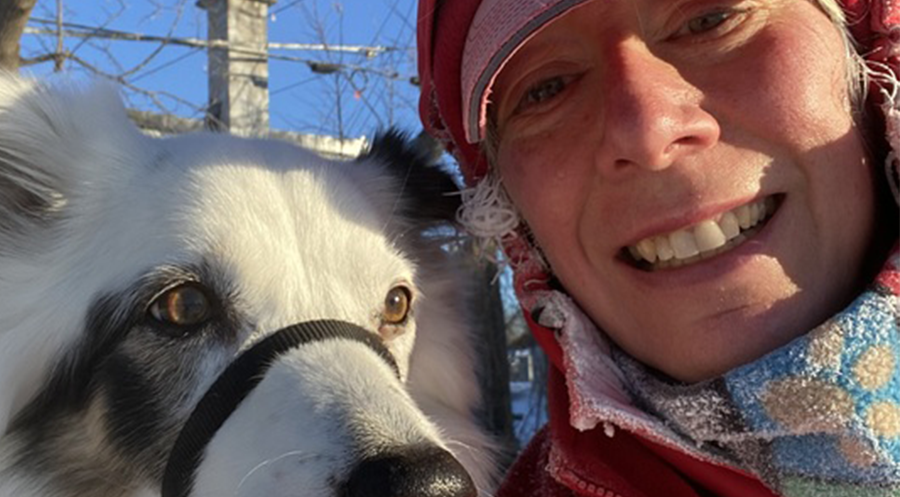
“I wish I didn’t have AFib… it would be nice. And, at the same time, I recognize that some of the positive decisions I’ve made in my life have been influenced by the insight that comes when you have a heart condition.”
Ann-Marie began experiencing atrial fibrillation (AFib) symptoms at a young age.
“I was 42 years old, and I happened to be at my family doctor’s office for an appointment for one of my daughters who was sick. I had previously talked to the doctor about something funny with my heart rhythm, but it was episodic. Because it wasn’t happening while I was there, she didn’t want to send me for an ECG. While at my daughter’s appointment, I said, “Remember when I talked to you about this heart rhythm thing? It’s off now.” She sent me downstairs in the building for an ECG right away, and sure enough, I was in AFib. That’s where it began, and it was real.
At first, I was in shock. I was 42, and what do you mean I have a heart condition? It just seemed like I was way too young and physically active. I had two busy kids, a great career, and everything was going well. It seemed like a very bizarre thing, and it triggered the start of a learning process.”
My family physician referred me to a cardiologist, which was a disaster. He asked if my AFib was bothering me, and I said it bothers me when I’m having an episode because I’m tired, weak, and can’t do what I want to do – I can’t be as active or meet commitments because I’m exhausted. He said, “You don’t need to worry too much. Just carry on with your life.” The episodes were every several months and lasted for six to twelve hours.
It’s a sentiment that many patients have shared many times: “You don’t need to worry about it too much .”Ann-Marie began gathering information about AFib, learning about the risks and potential adverse outcomes.
“I learned that not worrying about it was not a good strategy. So, I returned to my family doctor and requested another referral. She sent me to the University of Ottawa Heart Institute, where we began trying to manage this condition more actively. In the beginning, medications weren’t very successful and I was referred for a catheter ablation — the first one worked. I didn’t have any episodes for about four to five years. Then they started up again, so I returned to my Electrophysiologist for another consult. I had another ablation that had no impact, and I’m still living with AFib. I’m managing it with a combination of medication and lifestyle changes.”
An avid researcher, Ann-Marie learned about CANet online and reached out to get involved.
She’s a VIRTUES Patient Working Group member and Dr. Mary Runte’s (Chair of the CANet Patient Advisory Council) patient focus group. In addition to her partnership with CANet, she’s Co-Chair of the Patient Partnership Council with the University of Ottawa Heart Institute. She is passionate about organizing heart-focused Webinars and leading peer support groups.
“The concept for the webinars came out of a feeling that when you’re in the middle of learning about your condition, you’re cramming in lots of research, and you’re reading the resources or tools that you’ve been given from your doctor or your cardiologist. After that initial phase, it tapers off. You settle into a pattern where you’re kind of coasting and maybe not hearing about all the latest research findings or what’s new. It’s about supporting the community and keeping people learning and thinking about their condition.
Another big piece of my Patient Partner work is leading a Women@Heart peer support group which is usually about six to ten women that have either just learned or have recently learned about their heart condition. We support each other in learning to live with a heart diagnosis. It’s not medical and all about learning from each other.”
Ann-Marie’s partnership work is driven by her desire to continually learn about what’s new in cardiac care management and feed her need to give back.
“Part of it is altruistic. When I retired from public service, I thought. This is my opportunity to dig in and do stuff I want. It’s what drives me, and I get to work my brain. One of the cardiologists I listen to on YouTube says, “What’s not shared is lost,” and I completely agree with that. If we’re not talking to patients about the research being done and the insights we’re gaining in ways that they can understand, we’re losing big opportunities to help people. I feel like there’s a real space for helping people to see the value of knowledge and what it can mean for them and their health.
Still, almost 20 years later, I get frustrated when I have an AFib episode. I feel I’m doing everything I need to do, like – living a healthy, active life – so, what the heck? Regardless, I try to live with gratitude, thankful for what I can do.
The stroke risk is always in the back of my mind when I’m having an episode, and so are a few other things, like the higher risk of dementia as we learn more about heart rhythm disorders. Having said that, the fragility of life when you have a heart condition makes you think about what you do with your time differently. I took a sabbatical and went travelling with my two daughters, and I don’t know if I would have done that if I hadn’t had a heart condition. It’s a reminder that the time you have and the things you invest in are super important and precious. So, make sure you’re doing things that are fulfilling for you.”
Join and share your experiences on our members-only Facebook discussion group for our community of patients and caregivers, click here.
Subscribe to our Ticker Times newsletter, click here.